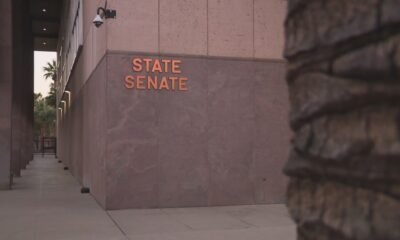Business
Crucial Vote for Obscure Corporation Commission Could Shape Arizona’s Renewable Energy Future

PHOENIX—Recent decisions by the Arizona Corporation Commission (ACC) have sparked significant controversy and mobilized various advocacy groups. The ACC has approved the construction of two gas power plants without soliciting public feedback and greenlit the expansion of another facility without conducting an environmental review.
Additionally, homeowners with rooftop solar systems now face new fees that the state’s attorney general has labeled “discriminatory” and “unconstitutional.” Customers of Arizona Public Service Co. (APS), the state’s largest utility, are also grappling with an 8 percent rate increase, primarily designed to fund expensive grid expansions, despite more affordable alternatives existing.
These actions, taken in the past year alone, reflect a trend criticized by environmentalists and legal experts, drawing lawsuits and calls for accountability from climate advocacy groups aimed at curbing the continued reliance on fossil fuels for electricity in Arizona.
In previous years, APS invested heavily in influencing ACC elections. This impending election cycle may prove pivotal, as the commission’s recent actions could determine its future composition, impacting Arizona’s climate policy and renewable energy trajectory. “When it comes to mitigating climate change … the corporation commission plays a huge role in that,” noted Emily Doerfler, a clean energy attorney with Western Resource Advocates.
Established in 1912, the ACC regulates the state’s water and power utilities, overseeing customer charges, utility profits, and the operation of Arizona’s power grid. With a Republican supermajority following the 2022 elections, the current commission is under scrutiny. Three seats are up for election this year, inviting debate on the direction of Arizona’s energy policies amid growing concerns over climate change.
The commission’s decisions are even more pressing this year, following another summer of extreme heat in Phoenix. Temperatures exceeded 100 degrees Fahrenheit for over 100 consecutive days, causing numerous heat-related deaths. Six candidates, split evenly between Democrats and Republicans, are contesting the three available seats, with only incumbent Lea Marquez Peterson seeking reelection.
Republican candidates, including Marquez Peterson, have consistently defended the commission’s recent actions, arguing that maintaining a balanced energy portfolio requires the continued use of fossil fuels. “As Arizona grows, we need to prepare for that energy demand, and energy reliability must be our No. 1 factor,” she stated during a recent debate.
In contrast, Democratic candidates Ylenia Aguilar, Jonathan Hill, and Joshua Polachek advocate for a shift toward renewable energy sources. They argue that a free-market approach would prioritize solar and reduce emissions, criticizing the current commission’s approach to rising energy costs and climate issues.
Hill emphasized that Arizona should embrace its solar potential, saying, “We are the sunshine capital of the entire country. There is no reason why Arizona should not be running entirely on solar.” Polachek echoed these sentiments, stressing the long-term implications of the commission’s decisions on future generations.
In recent years, the ACC seemed to move toward a renewable energy future. However, the Republican supermajority has since approved multiple natural gas projects while attempting to reduce existing renewable standards. These decisions favor utility investments in fossil fuels, which are historically more lucrative but detrimental to ratepayers and the environment.
This year, major headlines centered around an 8 percent rate hike for APS customers coupled with the approval of a fee for rooftop solar. The ACC also authorized the expansion of UNS Electric’s Black Mountain Generating Station without the mandated environmental review, challenging decades of precedent. This prompted legal action from several advocacy groups and the state attorney general.
The ACC’s recent moves have drawn widespread condemnation. Critics assert that the decisions undermine the commission’s responsibility to protect the interests of Arizona’s residents. As the commission exercises substantial influence over the state’s fossil fuel reliance, its upcoming election could redefine Arizona’s energy landscape.
In summary, the actions of the Arizona Corporation Commission are under intense scrutiny as the state heads into a critical election cycle. With significant implications for residents and the environment, the choices they make will shape the future energy framework of Arizona.

















